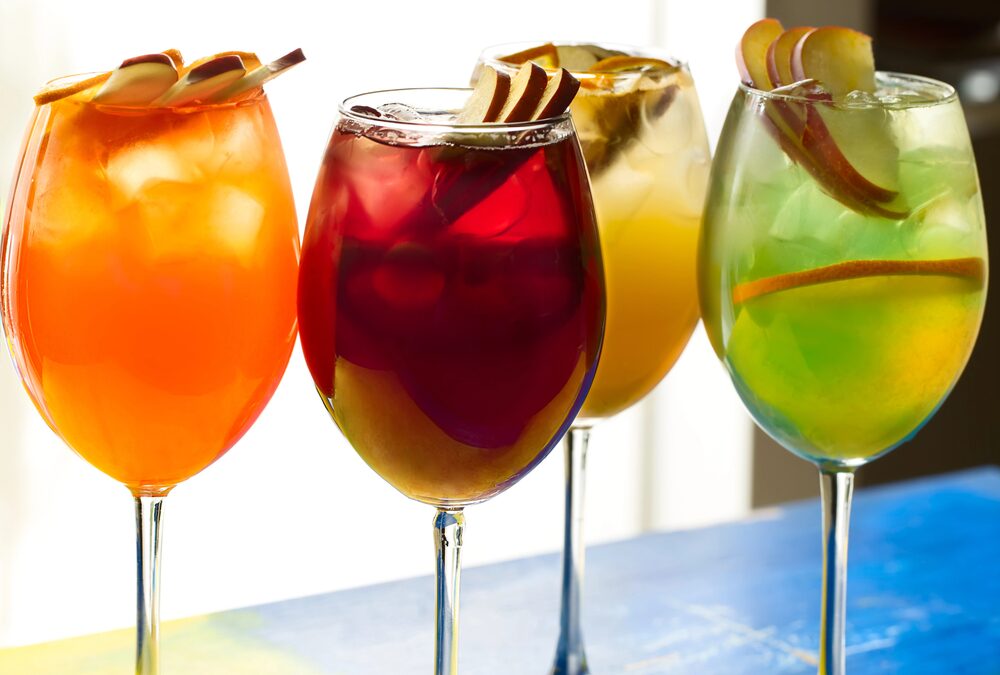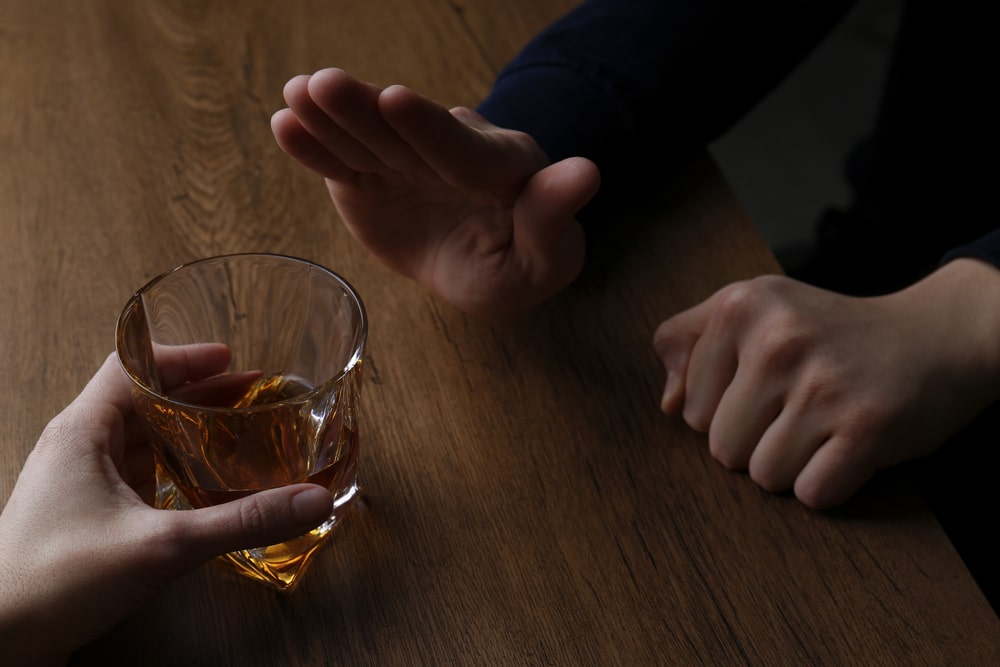The widespread popularity of mixing an energy drink with alcohol in today’s fast-paced world has given rise to a dangerous combination. Despite the appeal and misconceptions surrounding this concoction, mixing alcohol and energy drinks can have severe consequences. In this blog post, we will uncover the hidden dangers of mixing alcohol and energy drinks, provide guidelines for responsible drinking, and discuss the importance of recognizing the signs of alcohol abuse and seeking help.
Short Summary
- The combination of alcohol with energy drinks is deceptive and potentially dangerous.
- Caffeine has a stimulating impact on the body, which can lead to excessive drinking when combined with alcohol.
- Making informed choices about alcohol consumption is essential for minimizing potential health risks associated with it, including addiction.
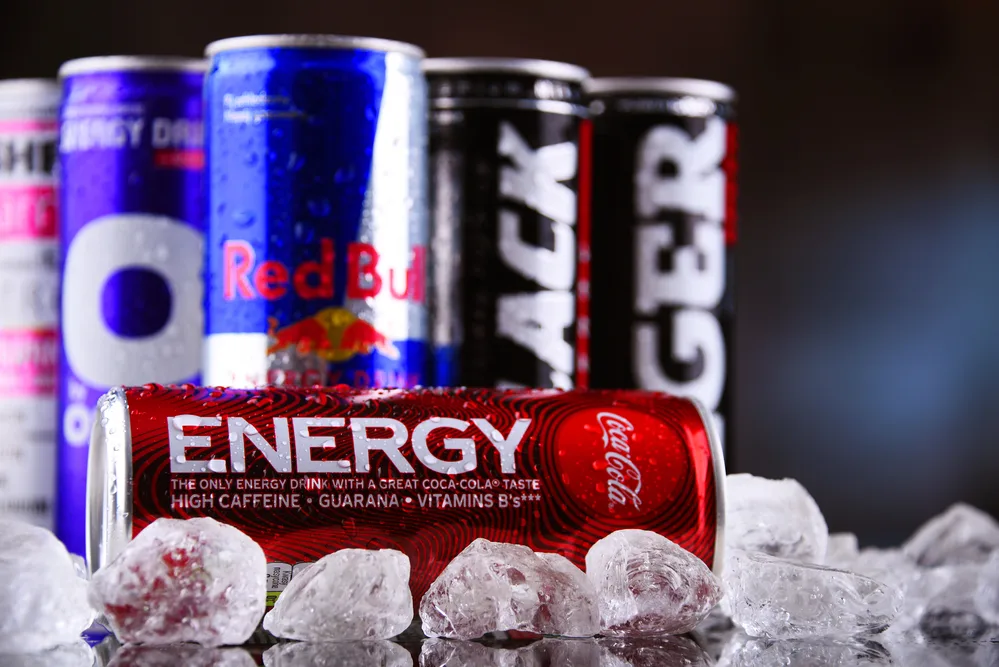
The Deceptive Combination: Alcohol and Energy Drinks
The combination of caffeinated alcohol drinks is highly deceptive, with marketing and media portrayal making them attractive to young adults. Research from the United States has demonstrated that a significant percentage of students and young adults have consumed alcohol and energy drinks (AMED) at least once in the past year.
This dangerous mix can create opposing physiological and psychological effects within the user, as the active ingredients found in energy drinks may affect the mechanism of alcohol-induced neurotransmission. The consequences of combining energy drinks with alcohol may include the development of unhealthy drinking habits, addiction, excessive energy drink consumption, alcohol poisoning, and overall health risks.
It is crucial to debunk the myths surrounding this dangerous combination and educate individuals on the potential risks of mixing these two substances.
The Appeal to Young Adults
Factors contributing to the appeal of alcohol and energy drinks among young adults include fruity flavors, marketing campaigns, and media portrayals geared towards a younger audience. More than half of college students practice alcohol mixed with energy drinks (AMED). Consumption during social gatherings, flavor enhancement of alcoholic beverages, and the pursuit of energy and pleasure are some potential motivators for consuming AMEDs.
A Purdue University study revealed that drinking highly caffeinated beverages induces changes in adolescents’ brains similar to the effects of taking cocaine, and these changes persist into adulthood. The lack of regulation over energy drinks has the potential to create dangerous interactions and further perpetuate alcohol dependence and binge-drinking.
Debunking the “Sobering” Myth
A common misconception is that energy drinks can counteract the effects of alcohol. However, combining alcohol and energy drinks can result in dehydration, overconsumption of alcohol, and alcohol poisoning. Additionally, it may increase the likelihood of accidents and heart problems.
This “sobering” myth needs to be debunked to prevent the dangerous consequences of mixing these two substances. Awareness and education about the potential risks are crucial to ensure the safety and well-being of those who consume alcohol and energy drinks.
The Double-Edged Sword: Opposing Effects of Alcohol and Caffeine
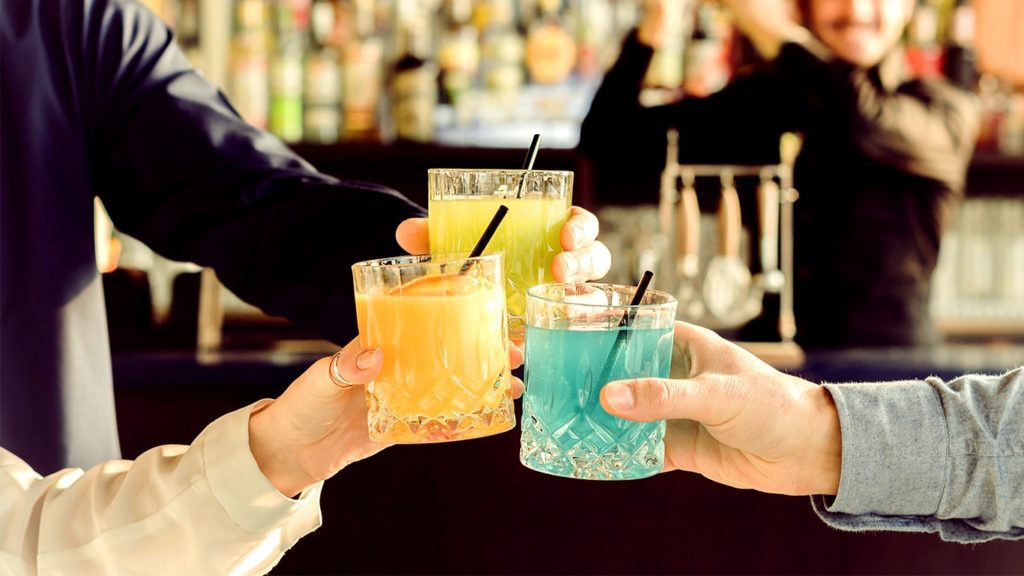
Caffeine is a stimulant that has various impacts on the body, while alcohol is generally classified as a hypnotic sedative that suppresses the central nervous system. When combined, caffeinated alcoholic beverages can create dangerous health risks like cardiovascular complications and increased addiction risk.
Alcohol-induced neurotransmission changes occur in the brain due to the consumption of alcohol, leading to the reinforcing euphoric effects of alcohol. Understanding the opposing effects of caffeinated alcoholic beverages is essential for individuals who consume these substances. Awareness of the potential risks can help prevent accidents, health issues, and addiction.
Caffeine’s Stimulating Impact
Caffeine is a central nervous system stimulant that has a range of effects on the body, including providing an energy boost and aiding in the regulation of blood pressure. Healthy adults are advised to limit their caffeine intake to 400 milligrams per day.
Caffeine indirectly heightens dopamine activity by inhibiting adenosine activity, an inhibitory neurotransmitter that promotes sedation and contributes to sleep in normal circumstances. The stimulating impact of caffeinated alcoholic beverages can mask the sedative effects of alcohol, leading to a false sense of sobriety and an increased risk of excessive drinking.
Alcohol’s Sedative Influence
Alcohol is a depressant that can influence the central nervous system and prompt an assortment of physical and mental impacts, including decreased inhibitions, interpersonal conflict, falls and accidents, frequent urination and dehydration, and an inflammatory response. Heavy drinkers may be more prone to illnesses such as tuberculosis or pneumonia, and increased alcohol consumption can result in permanent brain damage or death.
It is essential to consume alcohol in moderation and to be cognizant of the potential risks associated with alcohol consumption. It is likewise imperative to be aware of the effects of combining alcohol with other substances, such as energy drinks.
Hidden Dangers: Health Risks of Mixing Alcohol and Energy Drinks
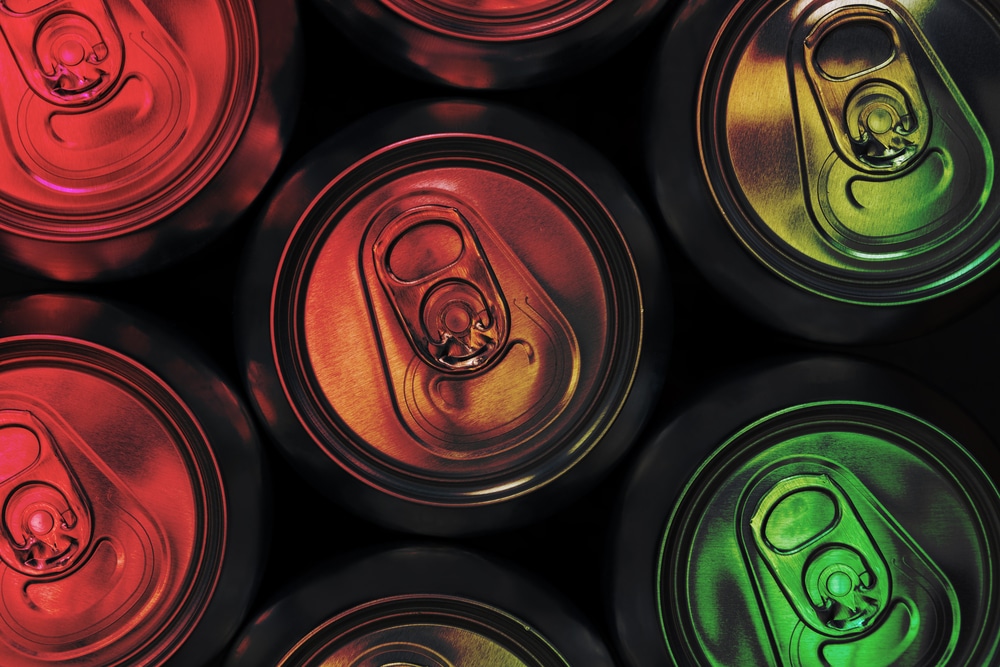
Low-risk drinking guidelines and making informed choices can help prevent excessive drinking and its associated risks. The caffeine in an energy drink can reduce the perception of drunkenness, leading to an increased risk of excessive drinking. There is a risk of cardiovascular complications, as well as an increased risk of addiction.
The UK Chief Medical Officers recommend consuming no more than 14 units of alcohol on a weekly basis, and if this amount is consumed, it should be spread evenly across the week with several days of abstaining from alcohol. Adhering to low-risk drinking guidelines and being aware of the potential risks of combining alcohol and energy drinks is crucial in preventing excessive drinking and the associated dangers.
Elevated BAC
One of the primary concerns when you mix energy drinks with alcohol is the effect on blood alcohol concentrations (BAC). When energy drinks are consumed in combination with alcohol, the caffeine and other stimulants in the energy drinks can mask the depressant effects of alcoholic drinks, leading individuals to underestimate their level of intoxication. This misperception can result in higher consumption of alcohol, subsequently increasing blood alcohol concentrations to dangerous levels. Elevated BAC poses serious risks, including impaired judgment, reduced coordination, and a heightened chance of alcohol related injuries.
Cardiovascular Complications
The combination of alcohol and energy drinks can raise blood pressure, heart rate, and the possibility of abnormal heart rhythms, potentially resulting in cardiovascular complications. Alcohol overdose can manifest itself in various ways. An increase in blood pressure, heart rate, anxiety attacks and seizures are some of the indications of an overdose.
Awareness of these potential cardiovascular complications is vital for those who choose to combine alcohol and energy drinks. It is important to understand the risks and make responsible decisions when consuming these substances.
Increased Addiction Risk
Combining alcohol and energy drinks can result in increased alcohol consumption and a false sense of security, potentially increasing the risk of addiction. The combination of alcohol and energy drinks can lead to a false sense of security due to the stimulating effects of the energy drinks masking the sedative effects of the alcohol, thus making it difficult to accurately assess one’s level of intoxication.
Increased alcohol consumption can lead to addiction due to the development of physical and psychological dependence, as well as tolerance to the effects of alcohol. To mitigate the risk of developing an addiction, it is essential to adhere to responsible drinking habits and be cognizant of the potential consequences of combining alcohol and energy drinks.
Low-risk drinking guidelines should be strictly followed, and individuals should make informed decisions regarding their drinking habits.
Prevention and Responsible Drinking
The National Institute on Alcohol Abuse and Alcoholism (NIAAA) states that low-risk drinking for women is defined as no more than 3 drinks on any single day and no more than 7 drinks per week, while for men, it is defined as no more than 4 drinks on any single day and no more than 14 drinks per week.
Combining alcohol and energy drinks can heighten the potential for alcohol-induced injuries, alcohol poisoning, and addiction. It can also cause cardiovascular problems, such as elevated heart rate and blood pressure.
Adhering to low-risk drinking guidelines and making informed decisions about alcohol consumption can help prevent the dangers associated with mixing alcohol and energy drinks. Being aware of the potential risks and making responsible choices can reduce the likelihood of excessive drinking and its associated consequences.
Low-Risk Drinking Guidelines
The National Institute on Alcohol Abuse and Alcoholism (NIAAA) outlines that women should consume no more than 3 drinks on any single day and no more than 7 drinks per week, whereas men should consume no more than 4 drinks on any single day and no more than 14 drinks per week for low-risk drinking. These guidelines are designed to minimize the risks associated with alcohol consumption and promote responsible drinking habits.
Following the low-risk drinking guidelines can help individuals maintain a healthy lifestyle and reduce the likelihood of developing alcohol-related issues, such as addiction or health complications.
Making Informed Choices
Exceeding the recommended amount of alcohol consumption can have serious implications for one’s health, including liver damage, heart disease, stroke, and cancer. Furthermore, it can lead to impaired judgment and an increased risk of accidents.
In addition, long-term excessive alcohol consumption can lead to addiction. It is important to be aware of the potential risks and to make responsible decisions about how much to consume. Being informed about the dangers of combining alcohol and energy drinks can help individuals make responsible choices and prevent excessive drinking.
Seeking Help and Recovery
Indications of requiring rehab for alcohol abuse may include being unable to restrict the quantity of alcohol you consume, desiring to decrease the amount you drink or making unsuccessful attempts to do so, devoting a considerable amount of time drinking, obtaining alcohol or recuperating from alcohol use, feeling a powerful craving or impulse to drink alcohol, tremors, slurred speech, impaired coordination, and deterioration of physical appearance, personal grooming habits.
A range of resources and substance abuse treatment options are available for those seeking assistance with alcohol abuse, such as counseling, support groups, and inpatient and outpatient treatment programs. Recognizing the signs of alcohol abuse and seeking help is crucial for successful recovery.
There are various resources and treatment options available to support individuals in overcoming alcohol addiction and regaining control of their lives.
Recognizing the Need for Help
Indications that professional assistance may be necessary for alcohol abuse may include physical symptoms such as tremors, sweating, and nausea, as well as behavioral changes like disregarding responsibilities and relationships. Other indications of difficulty controlling alcohol intake may include excessive consumption, increased frequency of consumption, and consumption in hazardous environments.
Certain indications may suggest someone is drinking alone, such as consuming alcohol in private, avoiding social gatherings, and using alcohol to manage emotions. Indications of withdrawal symptoms when abstaining from alcohol may include anxiety, irritability, and insomnia.
Recognizing the need for help is the first step towards recovery. Being aware of the signs and symptoms of alcohol abuse can help individuals seek the necessary support and treatment.
Available Resources and Treatment Options
Treatment options for those seeking assistance with alcohol abuse include individual counseling, group therapy, support groups, residential treatment programs, and medication-assisted treatment. The most effective treatment for alcoholism may involve a brief intervention, individual or group counseling, an outpatient program, or a residential inpatient stay. The U.S. Food and Drug Administration has approved three medications to treat alcohol use disorder: acamprosate, disulfiram, and naltrexone.
Utilizing the available resources and treatment options for alcohol abuse can aid in the recovery process and help individuals regain control of their lives. It is essential to seek help and support in overcoming alcohol addiction and establishing a healthy, balanced lifestyle.
Summary
Throughout this blog post, we have discussed the deceptive nature of mixing alcohol and energy drinks, the opposing effects of alcohol and caffeine, and the hidden dangers that can arise from combining these two substances. By adhering to low-risk drinking guidelines and making informed choices, individuals can prevent excessive drinking and its associated risks. Recognizing the signs of alcohol abuse and seeking available resources and treatment options can lead to successful recovery and a healthier, more balanced lifestyle.
As we raise awareness of the dangers associated with mixing alcohol and energy drinks, it is crucial for individuals to make responsible decisions and prioritize their health and well-being. Together, we can work towards a safer, more informed future for all.
Frequently Asked Questions
